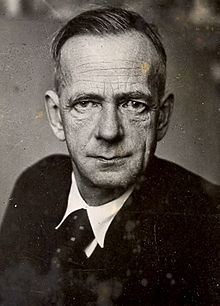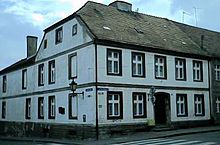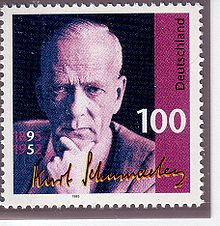- Kurt Schumacher
-
This article is about the German politician. For the American football player, see Kurt Schumacher (American football).
Kurt Schumacher 
As witness during the Nuremberg Trials Chairman of the
Social Democratic Party of GermanyIn office
10 May 1946 – 20 August 1952Preceded by Hans Vogel Succeeded by Erich Ollenhauer Personal details Born Curt Ernst Carl Schumacher
13 October 1895
Kulm, West Prussia, German EmpireDied 20 August 1952
Bonn, West GermanyPolitical party Social Democratic Party of Germany Occupation Jurist Dr. Kurt Schumacher (13 October 1895 - 20 August 1952), was chairman of the Social Democratic Party of Germany from 1946 and first Leader of the Opposition in the West German Bundestag parliament from 1949 until his death. A fierce opponent of both the East German Socialist Unity Party and Chancellor Konrad Adenauer's government, he was one of the founding fathers of post-war German democracy.
Contents
Early career
Kurt Schumacher was born in Kulm in West Prussia (now Chełmno in Poland), the son of a small businessman, member of the liberal German Free-minded Party and deputy in the municipal assembly. The young man was a brilliant student, but when the First World War broke out in 1914 he immediately abandoned his studies and joined the German Army. In December, at Bielawy west of Łowicz in Poland, he was so badly wounded that his right arm had to be amputated. After contracting dysentery, he was finally discharged from the army and was decorated with the Iron Cross 2nd class. He returned to his law and poltics studies in Halle, Leipzig and Berlin, where he graduated in 1919.
Inspired by Eduard Bernstein, Schumacher became a dedicated socialist and in 1918 joined the Social Democratic Party (SPD) leading ex-servicemen in forming Workers and Soldiers Councils in Berlin during the revolutionary days following the fall of the German monarchy. He opposed various attempts by Communist groups to seize power. In 1920 the SPD sent him to Stuttgart to edit the party newspaper there, the Schwäbische Tagwacht.
Schumacher was elected to the Württemberg Landtag (state legislature) in 1924 and in 1928 became the SPD leader in the state. When the Nazi Party rose to prominence, Schumacher helped organize socialist militias to oppose them. In 1930 he was elected to the national legislature, the Reichstag. In August 1932 he was elected to the SPD leadership group; at age 38 he was youngest SPD member of the legislature.
Under the Nazis
Schumacher was staunchly anti-Nazi. In a Reichstag speech on February 23, 1932, he excoriated Nazism as "a continuous appeal to the inner swine in human beings" and stated the movement had been uniquely successful in "ceaselessly mobilizing human stupidity."[1] The inability of the SPD and the German Communist Party to form a united front meant that they couldn't prevent the Nazis coming to power in January 1933. Schumacher was arrested in July and was severely beaten in prison. He spent the next ten years in concentration camps at Heuberg, Kuhberg, Flossenbürg and Dachau. The camp at Dachau was intended for people whom the Nazis wanted to keep alive, and the fact that he was a disabled ex-service man gained Schumacher some leniency, but he risked his life through repeated defiance and hunger strikes.
In 1943, when Schumacher was near death, his brother-in-law succeeded in persuading a Nazi official to have him released into his custody. He was arrested again in late 1944, and he was in Neuengamme concentration camp when the British arrived in April 1945.
Postwar politics
Schumacher wanted to lead the SPD and bring Germany to socialism. By May he was already reorganising the SPD in Hanover, without the permission of the occupation authorities. He soon found himself in a battle with Otto Grotewohl, the leader of the SPD in the Soviet Zone of Occupation, who was arguing that the SPD should merge with the Communists to form a united socialist party. Schumacher rejected Grotewohl's plan. In August he called an SPD convention in Hanover, which elected him as "western leader" of the party.
In January 1946 the British and Americans allowed the SPD to reform itself as a national party, with Schumacher as leader. As the only SPD leader who had spent the whole Nazi period in Germany, without collaborating, he had enormous prestige. He was certain that his right to lead Germany would be recognised both by the Allies and by the German electorate.[citation needed]
But Schumacher met his match in Konrad Adenauer, the former mayor of Cologne, whom the Americans,[who?] not wanting to see socialism of any kind in Germany, were grooming for leadership. Adenauer united most of the prewar German conservatives into a new party, the Christian Democratic Union (CDU). Schumacher campaigned through 1948 and 1949 for a united socialist Germany, and particularly for the nationalisation of heavy industry, whose owners he blamed for funding the Nazis' rise to power. When the occupying powers[who?] opposed his ideas, he denounced them. Adenauer opposed socialism on principle, and also argued that the quickest way to get the Allies to restore self-government to Germany was to co-operate with them.
Schumacher wanted a new constitution with a strong national presidency, confident that he would occupy that post. But the first draft of the 1949 Grundgesetz provided for a federal system with a weak national government, as favoured both by the Allies and the CDU. Schumacher refused to give way on this, and eventually the Allies, keen to get the new German state functioning in the face of the Soviet challenge, conceded some of what Schumacher wanted. The new federal government would be dominant over the states, although the president would be weak.
Schumacher versus Adenauer
The Federal Republic's first national elections were held in August 1949. Schumacher was convinced he would win, and most observers agreed with him. But Adenauder's new CDU had several advantages over the SPD. Some of the SPD's strongest areas in pre-war Germany were now in the Soviet Zone, while the most conservative parts of the country - Bavaria and the Rhineland - were in the new Federal Republic of Germany. In addition both the American and French occupying powers favoured Adenauer and did all they could to assist his campaign; the British remained neutral.
Further, the onset of the Cold War, and particularly the behavior of the Soviets and the German Communists in the Soviet Zone, produced an anti-socialist reaction in Germany as elsewhere. The SPD would very plausibly have won an election in 1945; by 1949 the tide had turned. The German economy was also recovering, thanks mainly to the currency reform of the CDU's Ludwig Erhard. Matters were complicated by Schumacher's ill-health: in September 1948 he had one of his legs amputated. Germans admired Schumacher's courage, but they doubted that he could carry out the duties of federal Chancellor.
Although Schumacher's SPD won the most seats of any single party in the election (though the CDU and its sister party the CSU together won more seats), the CDU was able to form a coalition government with the Free Democratic Party, the Christian Social Union, and the German Party, and Adenauer was voted Chancellor. This was a shock to Schumacher. He refused to co-operate in parliamentary matters and denounced the CDU as agents of the capitalists and foreign powers. Although he also denounced the Communists, and in fact organised an underground SPD resistance network in eastern Germany, his anti-capitalist and anti-Western rhetoric sounded sufficiently similar to Communist propaganda to undermine his support.[citation needed]
Schumacher further damaged his standing[by whom?] by opposing the emerging new organisations of European co-operation, the Council of Europe, the European Coal and Steel Community and the European Defence Community, which he saw as devices for strengthening capitalism (which in a way they were), and for extending Allied control over Germany (which they were not).[citation needed] This stand aroused the opposition of the other west European socialist parties, and eventually the SPD overruled him and sent delegates to the Council of Europe.
During the rest of Adenauer's first term in office, Schumacher continued to oppose his government, but the rapid rise in German prosperity, the intensification of the Cold War and Adenauer's increasing success in getting Germany accepted in the international community all worked to undermine Schumacher's position. The SPD began to have serious doubts about going into another election with Schumacher as leader, particularly when he had a stroke in December 1951. They were spared having to deal with this dilemma when Schumacher died suddenly in August 1952.
Adenauer admired Schumacher's integrity, willpower and courage, even while opposing his policies, and was shocked at his death.[citation needed] "Despite our differences", he said, "we were united in a common goal, to do everything possible for the benefit and well-being of our people."
Citations
- ^ Judt, p. 268
Sources
- Tony Judt. Postwar A History of Europe since 1945, New York: Penguin Books, 2005. ISBN 0-14-303775-7.
External links
- (German) SPD Schumacher tribute website
- German election results 1949-2002 from Adam Carr's Election Archives
Party political offices Preceded by
Hans VogelChairman of the Social Democratic Party of Germany
1946–1952Succeeded by
Erich OllenhauerSPD
(1890–1933)Paul Singer / Alwin Gerisch · August Bebel / Paul Singer · August Bebel / Hugo Haase · Hugo Haase / Friedrich Ebert · Friedrich Ebert · Friedrich Ebert / Philipp Scheidemann · Otto Wels / Herman Müller · Arthur Crispien / Otto Wels / Herman Müller · Arthur Crispien / Otto Wels · Arthur Crispien / Otto Wels / Hans Vogel
SPD-in-exile
(1933–1945)SPD
(since 1946)Kurt Schumacher · Erich Ollenhauer · Willy Brandt · Hans-Jochen Vogel · Björn Engholm · Rudolf Scharping · Oskar Lafontaine · Gerhard Schröder · Franz Müntefering · Matthias Platzeck · Kurt Beck · Franz Müntefering · Sigmar GabrielFriedrich Ebert (1919) · Otto Braun (1925) · Paul von Hindenburg (1932, endorsed) · Kurt Schumacher (1949) · Theodor Heuss (1954, endorsed) · Carlo Schmid (1959) · Heinrich Lübke (1964, endorsed) · Gustav Heinemann (1969) · Walter Scheel (1974, endorsed) · Annemarie Renger (1979) · Richard von Weizsäcker (1984, de facto endorsed) · Richard von Weizsäcker (1989, endorsed) · Johannes Rau (1994) · Johannes Rau (1999) · Gesine Schwan (2004) · Gesine Schwan (2009) · Joachim Gauck (2010) Categories:
Categories:- Social Democratic Party of Germany politicians
- German anti-communists
- German amputees
- German presidential candidates
- People from Chełmno
- People from West Prussia
- Politicians with physical disabilities
- University of Leipzig alumni
- 1895 births
- 1952 deaths
- Dachau concentration camp survivors
- Flossenbürg concentration camp survivors
- Neuengamme concentration camp survivors
Wikimedia Foundation. 2010.


